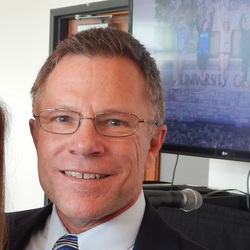Associate Professor
Email: aschoeffield@loyola.edu
Phone: 410-617-2912
Fax: 410-617-5682
Office
Donnelly Science 276
Department of Biology
Loyola University Maryland
4501 North Charles Street
Baltimore, MD 21210-2699
Biography
As a microbial ecologist, I am extremely interested in the roles of bacteria in aquatic ecosystems; how bacterial populations are interacting with one another, and how their interactions with one another effect the ecosystem as well as other organisms within that ecosystem. Specifically, I am interested in the ecological roles of a unique group of bacteria that prey upon other bacteria, collectively known as bdellovibrios. Our lab has recently demonstrated bdellovibrios ability to prey on bacteria existing in a very different physiological state common in aquatic ecosystems, a sort of "hibernating form" of the prey that we refer to as a viable-non-culturable state. This is significant because it has been shown that pathogenic (disease causing) bacteria in a viable-non-culturable state can still cause human disease. Our research team here at Loyola has also been involved in understanding the interaction of bdellovibrios ability to 1) associate with and become a member of the biofilm community, 2) prey upon susceptible members of the community, and 3) reduce the number of attached prey bacteria. Because the role of biofilms range from extremely useful (they may function to cleanse water), to very harmful (they accumulate toxic compounds and recruit oyster larvae to cement themselves on these "toxin-contaminated" surfaces), the effects of bdellovibrios on biofilms may have far reaching consequences. Understanding these consequences is a major thrust of my current work and we are now assessing the effect of bdellovibrios on insecticide-contaminated biofilms.
Publications
- Rivers, D. B., G. Cavanagh, V. Greisman, A. McGregor, R. Brogan and A. Schoeffield. 2019. Immunoassay detection of fly artifacts produced by several species of necrophagous flies following feeding on human blood. Forensic Sci. Int. 1: 1-10.
- Novaira, H. J., A. L. Negron, J. B. Graceli, S. Capellino, A. Schoeffield, G. E. Hoffman, J. E. Levine, A. Wolfe, F. E. Wondisford and S. Radovick. 2018. Impairments in the Reproductive Axis of Female Mice Lacking Estrogen Receptor β in GnRH Neurons. Amer. J. Physiol. Endo. Metabol. 315(5): E1019–E1033.
- Rivers, D. B., G. Acca, M. Fink, R. Brogan, D. Chen and A. Schoeffield. 2018. Distinction of Fly Artifacts from Human Blood using Immunodetection. J. Forensic Sci. 63(6):1704-1711.
- Novaira, H. J., J. B Graceli, S. Capellino, A. Schoeffield, G. Hoffman, A. Wolfe, F. Wondisford and S. Radovick. 2016. Development and characterization of novel rat anti-mERβ sera. Endocrinology. 157 (7): 2844-2852.
- de la Peña, A. H., A. Suarez, K. C. Duong-ly, A. J. Schoeffield, M. Pizarro, M. Zarr, S. A. Pineiro, L. M. Amzel and S. B. Gabelli. 2015. Structural and Enzymatic Characterization of a Nucleoside Diphosphate Sugar Hydrolase from Bdellovibrio bacteriovorus. PLoS ONE. 10(11): e0141716.
- Graceli, J.B., Capellino, S., Schoeffield, A., Novaira, H.J., Wondisford, F.E., Wolfe, A. and Radovick, S. 2014. Reproductive Axis Disruption of Mice Lacking Estrogen Receptor β in GnRH Neurons. GnRH & Gonadotroph Biology & Signaling (pp. OR30-2). Endocrine Society.
- Rivers, D. B., G. Acca1, M. Fink1, R. Brogan, and A. Schoeffield. 2014. Spatial characterization of proteolytic enzyme activity in the foregut region of the adult necrophagous fly, Protophormia terraenovae. J. Insect Physiol. 67: 45-55.
- Duong-Ly, K. C., S. B. Gabelli, W. Xu, C. A. Dunn, A. J. Schoeffield, M. J. Bessman, and L. M. Amzel. 2011. The Nudix Hydrolase CDP-Chase, a CDP-Choline Pyrophosphatase, is an Asymmetric Dimer with Two Distinct Enzymatic Activities. J. Bacteriol. 193:3175-3185.
Area of Specialization
- The roles of bacteria in aquatic ecosystems